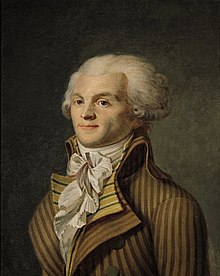 What's moral? In a classic example of what the author George Orwell might call "doublespeak," the long dead French politician Robespierre, most (in)famous for his role in the Reign of Terror during the French Revolution, opined that, "The springs of popular government in revolution are at once virtue and terror: virtue, without which terror is fatal; terror, without which virtue is powerless."
What's moral? In a classic example of what the author George Orwell might call "doublespeak," the long dead French politician Robespierre, most (in)famous for his role in the Reign of Terror during the French Revolution, opined that, "The springs of popular government in revolution are at once virtue and terror: virtue, without which terror is fatal; terror, without which virtue is powerless."According to Robespierre, without virtue, that is, moral excellence, terror, that is, actions intended to intimidate or frighten, is inutile. It means nothing. But wait: how can we equate moral excellence with actions intended to frighten and harm? On the other hand, how can we make, as Robespierre does in the next phrase, terror the upholder of moral excellence? Again, we're conflating something that most of us would applaud (moral excellence) with actions that most of us would condemn (terror).
Nonetheless, Robespierre has identified a problem that arises whenever anyone insists that her version of virtue, that is, moral excellence, deserves anything she does to implement and express it. Repeatedly throughout history, people, religious or not, have used terror to achieve what they considered to be good and laudable goals. So convinced are they of the righteousness of their perspective that they are ready and willing to do whatever they can, including terror, to implement and promote it.
Underlying this problem is an even bigger one: how do we decide what is truly "moral"? For many of us, morality is relative. Yet this leaves us with more questions than answers: how do we balance competing moral claims? For others, morality is defined by an absolute standard, something that is always binding and true. But this can lead to the issue we posed earlier: who decides what is binding and true?
If we say that religion, transcendent religion, decides, we come to another problem: every religion cannot be right at the same time. So who is right?
Well, one might say, God. But who knows what God is really saying?
Perhaps it is those who do not try to define God in their own image. Perhaps it is those who do not try to make God the product of their baggage and imaginations. Perhaps it is those who allow God to speak to them when they least want him to, when they have no idea what he will say, indeed, when they do not want God to say anything, when they are willing to admit to themselves that they are the products of mysteries beyond their comprehension.
Perhaps it is those who are ready to be human beings, and only human beings, in an unfathomable yet, and this is the conundrum, clearly personal universe.
There's always more to knowing than we can know.
No comments:
Post a Comment